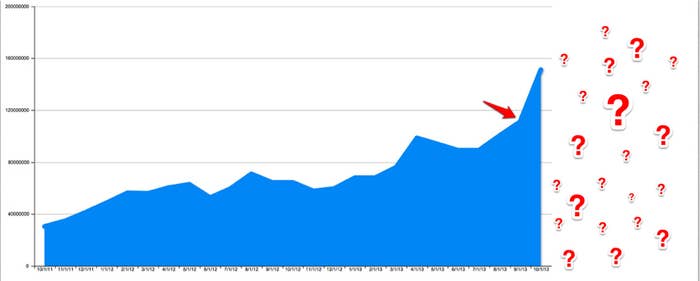
Recent changes to Facebook's News Feed algorithms have lavished online publishers with unprecedented referral traffic, creating a ripple effect throughout the news industry. In September, stately newspaper sites set a digital traffic record, seeing an 11% gain in visitors since June, while Facebook referrals from BuzzFeed's diverse partner network of sites increased by 69% from August to October.
In other words, things are going great. But traffic-bound publishers are growing anxious that yet another algorithm change could erase the big gains of the last few months — that traffic could disappear just as quickly as it came.
"We're starting to get very nervous," one staffer at a major paper told BuzzFeed. "It's scary that they can get everyone hooked on such high referral traffic then take it away so quickly with a quick flip of their algorithm," the staffer said, noting that there are even certain contingency plans in place in case of a change. Traditional internet advertising models depend somewhat on predictable traffic: a big month with low ad commitments is a lost opportunity; a low traffic month with over-sold ads is an immediate problem.
"We've made a concerted effort to try to diversify social traffic sources, putting more efforts into Twitter, Pinterest, etc., just as a hedge in case Facebook decides to pull the rug out," the staffer said.
Others are more resigned to a reset, but feel that, whatever the outcome, Facebook will continue to court media companies. "It's something I'm watching closely, for sure. Nobody wants to rise or fall on the whims of an algorithm, but if Facebook wants to be the gatekeeper, there's nothing publishers can do to stop that," a social media editor at a prominent website noted. "They're gonna keep tinkering with the algorithm, so I expect the referral surge will taper off. I'm not worried, though. Facebook has a hundred billion reasons why they need to support 'high-quality content,' which means they won't abandon publishers anytime soon."
For smaller, less Facebook-dependent sites, there may be less reason for concern. The director of business development at The New Republic, Noah Chestnut, notes that "the mood here is trending towards excitement over nervousness. The spikes in November sent over 1.5 million new readers to our site. Our challenge is to persuade these new readers they want to come back on their own volition," he said, noting that the bump may be more troubling for larger, Facebook-reliant publishers. "I can understand why a publication aiming to have 50m+ uniques would find this nerve-racking since outside of Facebook and Google, there is no other platform to offer this level of scale. If you become reliant on Facebook for 30% of your traffic at that size, you are vulnerable. For us, we care about building a more loyal audience that values quality and our point of view. We have our own set of challenges, but for now, we don't have the luxury to be worried about Facebook." (TNR, incidentally, is owned by Facebook co-founder Chris Hughes.)
Ideally, Facebook's News Feed manager Lars Backstrom says he would like to let user data and the algorithms speak for themselves, telling BuzzFeed, "we do not want to bring our own biases into this...we definitely don't want to get into the role of saying, 'You're a good guy, you're a bad guy.'"
The teams at Facebook responsible for honing these complex algorithms have no doubt been monitoring their effects closely. Whether giving publishers a larger share of Facebook traffic is part of a long-term plan or a side effect of more general adjustments remains unclear, but among ChartBeat-obsessed publishers, there seems to be a prevailing feeling of caution, and a keen knowledge that the bottom could drop out at any moment.
The anxiety isn't without a precedent. As All Things D's Peter Kafka noted in an earlier interview with Backstrom, the situation feels a lot like Google's algorithm changes of the past few years, which left sites like Demand Media, which took advantage of aggressive search engine optimization, flat-footed.
At the very least, Facebook's decision to move beyond treating all "likes" as equal has introduced a new sense of instability. Publishers are beginning to regard Facebook less as a system to be figured out, or gamed, than an ever-changing mystery. A strong ally, until it isn't.
"We went up for one of their summit things a few weeks ago and we got the sense they didn't even really know how this massive beast they have actually works," one staffer at a major magazine told BuzzFeed of News Feed's influence. "And that they can make or break entire companies."
